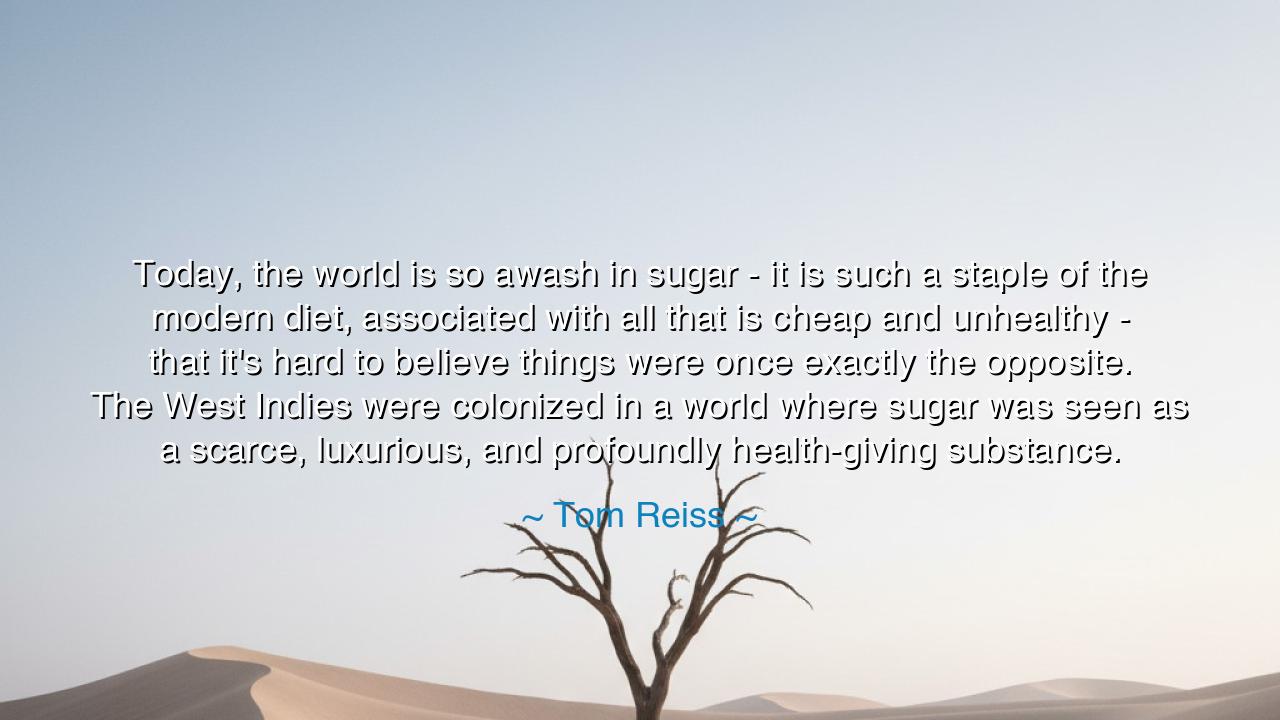
Today, the world is so awash in sugar - it is such a staple of
Today, the world is so awash in sugar - it is such a staple of the modern diet, associated with all that is cheap and unhealthy - that it's hard to believe things were once exactly the opposite. The West Indies were colonized in a world where sugar was seen as a scarce, luxurious, and profoundly health-giving substance.






The words of Tom Reiss, “Today, the world is so awash in sugar — it is such a staple of the modern diet, associated with all that is cheap and unhealthy — that it's hard to believe things were once exactly the opposite. The West Indies were colonized in a world where sugar was seen as a scarce, luxurious, and profoundly health-giving substance,” speak not only of history, but of the turning of the great wheel of human folly. In these lines, Reiss reminds us of the rise and fall of desire, of how that which is rare becomes worshiped, and how worship leads to excess, decay, and the loss of wisdom. His words echo the ancient rhythm of civilization itself — the eternal cycle of temptation, abundance, and corruption.
There was a time when sugar was a treasure. In the courts of kings, it was guarded like gold; its whiteness was the mark of purity, its sweetness a gift thought to heal and renew. Physicians of old prescribed it as medicine; nobles displayed it in glittering sculptures to adorn their feasts. The great powers of Europe, intoxicated by its sweetness, set their sails to the West, and from their lust for it were born empires and chains. The West Indies became the stage upon which the tragedy of desire played out — a paradise of sun and soil transformed into a machine of suffering, where human lives were traded to satisfy the hunger for luxury. Thus, the story of sugar is the story of humanity’s eternal struggle between appetite and morality.
In those early centuries, the sweetness of sugar blinded the world to its price. Men believed it to be health-giving, a divine essence drawn from the cane, a symbol of refinement and civilization. Yet in their pursuit of sweetness, they soured the earth. The plantations spread across the Caribbean like scars, watered not by rain alone but by the tears of the enslaved. Millions were torn from their homelands, condemned to labor in the blazing sun so that others might sip sweetness from porcelain cups. What was thought to be sacred became poison, not only to the body, but to the soul of nations.
And now, as Reiss laments, the wheel has turned. What was once the luxury of kings has become the curse of the common man. The modern world swims in sugar, not as a symbol of wealth, but of addiction. It hides in every corner of the modern diet — in bread, in sauces, in drinks that glitter with artificial joy. No longer a medicine, it has become a toxin; no longer a privilege, it has become a plague. The sweetness that once symbolized health now carries the shadow of disease — of obesity, diabetes, and decay. Thus, history reveals its cruel irony: the treasure that built empires now consumes the world that once desired it.
There is a deeper lesson here — that abundance without wisdom becomes destruction. Every age must learn this truth anew. What we praise without question, we will one day regret. What we desire without discipline, we will one day fear. The ancients spoke of hubris, the pride that blinds men to the consequences of their excess. Sugar, in its story, is but one face of that pride — a mirror in which humanity sees itself, forever reaching for more sweetness, more pleasure, until the body falters and the spirit grows dull.
Consider the story of Alexander the Great, who conquered half the known world, only to weep when there were no more lands to take. Like sugar, his victories began as glory and ended as burden. He died young, undone by his own appetite for greatness — as we too are undone by our appetite for ease. The ancients would see in this the same pattern Reiss describes: the transformation of blessing into curse, the decay that follows unmeasured desire. For the gods of plenty are jealous gods; they give with one hand and take with the other.
Let this, then, be the teaching: the sweetness of life must be earned, not consumed without thought. Let moderation be your guide, and gratitude your seasoning. Honor what the earth gives you by taking only what you need. Eat not for indulgence, but for vitality; seek not the fleeting pleasure of sugar, but the lasting joy of balance. Remember that every delight has its shadow, and that wisdom lies in knowing when to stop before delight turns to dependence.
And as you walk through this world awash in sweetness, remember the price of that sugar — not only in your own health, but in the history written in blood and soil. May you taste with awareness, live with restraint, and find your sweetness in things that leave no bitterness behind. For only then can humanity break the endless cycle of desire, and rediscover the sacred truth the ancients knew: that the sweetest thing in life is balance itself.






AAdministratorAdministrator
Welcome, honored guests. Please leave a comment, we will respond soon